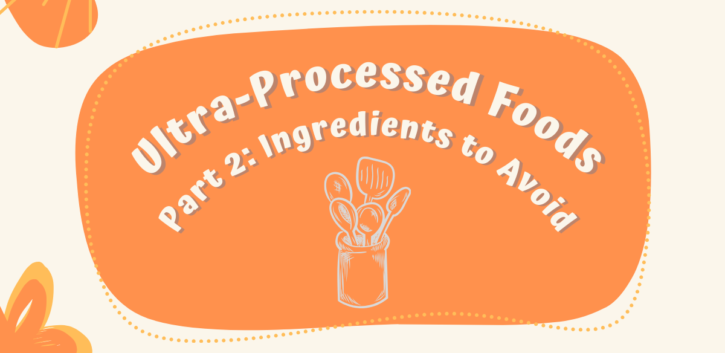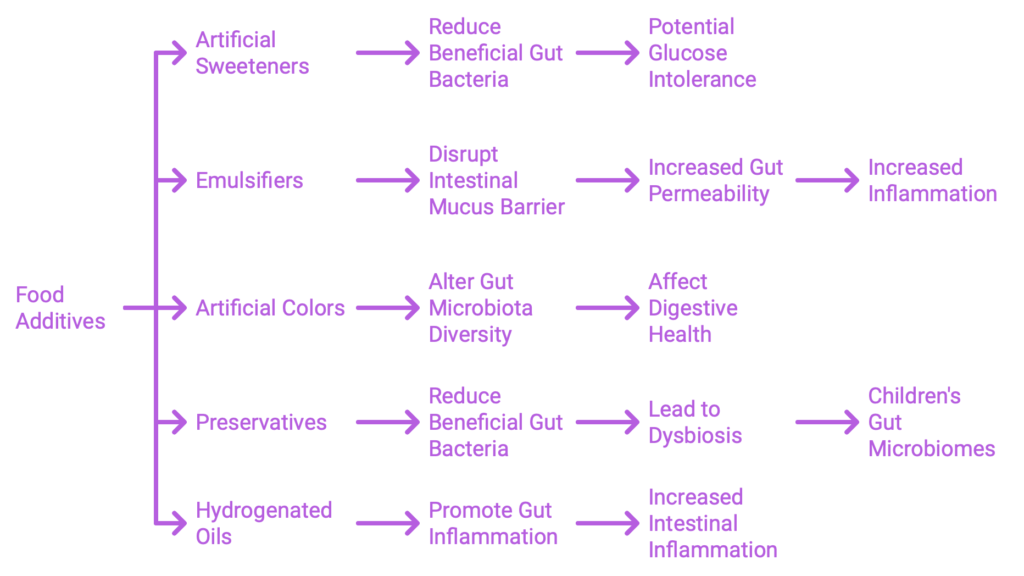Last week on the email and on the blog we dove into the world of ultra-processed foods, and I hope you found it eye-opening (and maybe even did a few extra label checks at the store!). Today, we’re taking it a step further to explore specific ingredients lurking in those ultra-processed foods and how they can impact your health.
Let’s jump in!
Ultra-Processed Ingredients
I created this visual on a few ingredients that are in many of the ultra processed foods, and not just “oh, they are bad,” but what research there actually is on them and specifically related to the gut and children’s health:
👉🏻Artificial Sweeteners
These sugar substitutes can alter the gut microbiome composition. A 2022 study found that artificial sweeteners may reduce beneficial gut bacteria and potentially lead to glucose intolerance.
👉🏻Emulsifiers
Common emulsifiers like carboxymethylcellulose and polysorbate-80 can disrupt the intestinal mucus barrier. Research from 2020 suggests this may increase gut permeability and inflammation.
👉🏻Artificial Colors
While primarily studied for behavioral effects, a 2021 review indicated that some artificial food colors may alter gut microbiota diversity, potentially affecting digestive health.
👉🏻Preservatives
Certain preservatives, such as sodium benzoate, have been shown to reduce beneficial gut bacteria populations. A 2019 study found this could lead to dysbiosis in children’s gut microbiomes.
👉🏻Hydrogenated Oils
These modified fats can promote inflammation in the gut. A 2023 study linked higher consumption of foods containing hydrogenated oils to increased markers of intestinal inflammation in children.
What This Means for Our Kids:
When children regularly consume foods with these ingredients, it may:
- Disrupt the balance of beneficial gut bacteria
- Increase intestinal permeability (“leaky gut”)
- Promote low-grade inflammation in the digestive system
- Potentially affect nutrient absorption and overall digestive health
It’s important to note that occasional consumption is unlikely to cause significant harm. The concern is with diets high in ultra-processed foods over time, again and again.
What Do We Do Today?
- Small baby changes to re-think what we feed our kids on the daily basis.
- Gradually increasing whole, minimally processed foods in children’s diets.
- Reading labels to identify and limit ultra-processed ingredients.
- Encouraging a variety of fruits, vegetables, and whole grains to support gut health.
- We make informed choices in the store and in the kitchen, without drastic changes or creating anxiety around food.
For Part III on this series of Ultra-Processed Foods, please visit this blog post!
Consider signing up for my weekly nutrition tips to get this sent directly to your inbox, along with my personal weekly meal plans and more!
Some of those articles
https://pmc.ncbi.nlm.nih.gov/articles/PMC10960188/
https://lordslibrary.parliament.uk/impact-of-ultra-processed-food-on-childrens-health/
https://www.cambridge.org/core/journals/british-journal-of-nutrition/article/consumption-of-ultraprocessed-foods-and-growth-outcomes-in-early-childhood-2015-pelotas-birth-cohort/9ACE11E8E7CD2D8BC14AB7D6620E22EF

